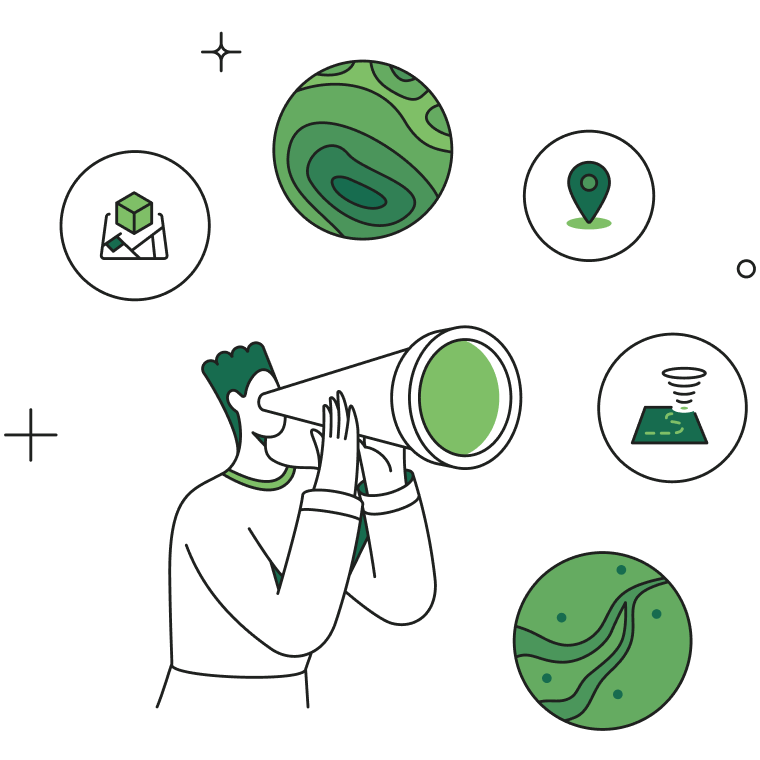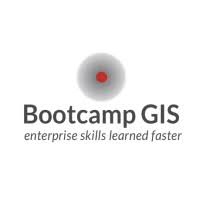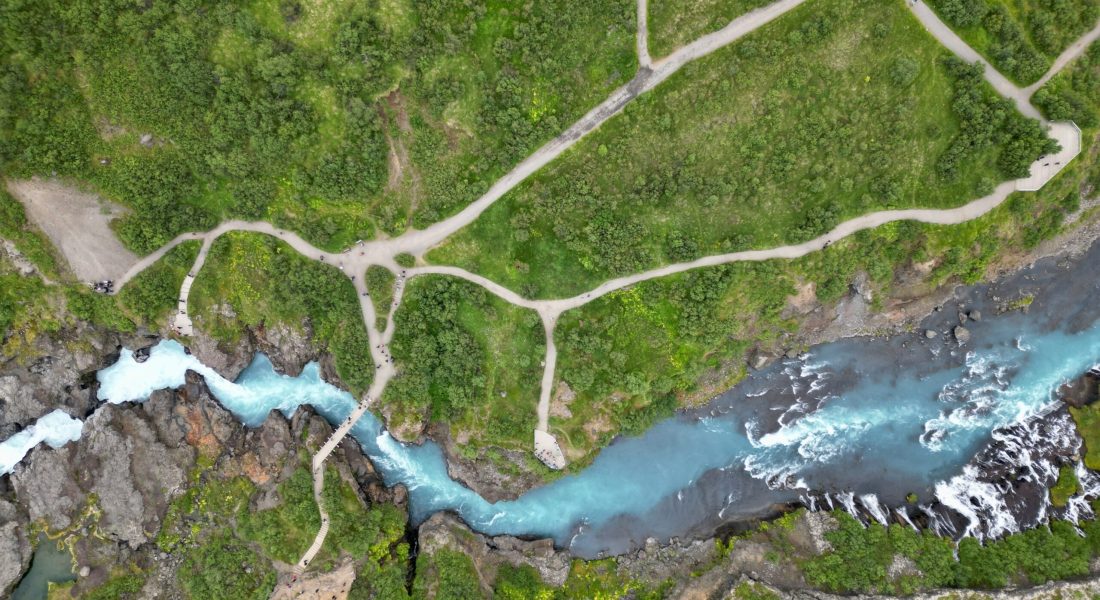Geospatial artificial intelligence, or GeoAI, is changing how we analyze maps, satellite images, and location data. It’s about using AI to solve real-world problems like tracking climate change, optimizing urban planning, or improving disaster response. If you’re curious about diving into this field, GeoAI courses can teach you the skills to work with spatial data and machine learning. From university programs to online platforms, there’s something for everyone, whether you’re a beginner or a pro looking to level up.

1. University of Florida GEO:AI
The University of Florida’s GEO:AI program, housed within the Geography Department, focuses on geospatial artificial intelligence, combining spatial science with machine learning, data mining, and high-performance computing to analyze spatial big data. The program integrates expertise from fields like geography, computer science, and statistics to address issues in medical geography, global health, GIScience, extreme events, and sustainability. Faculty research includes projects on geospatial modeling of diseases, social-ecological problems, atmospheric systems, and coastal analysis, often using AI and machine learning techniques.
The program offers a GEO:AI certificate and courses such as GeoAI: Geographic Artificial Intelligence and Geocomputation Using R Programming, aimed at developing skills for real-world geospatial challenges. Faculty members, including Dr. Jane Southworth, Dr. Michael Norris, and Dr. Johanna Engström, conduct research funded by organizations like the National Science Foundation. The department, located at Turlington Hall in Gainesville, has a history of applying AI to geographical and societal problems, with recent hires in 2022 expanding expertise in climatology and remote sensing.
Key Highlights
- Combines spatial science with AI, focusing on machine learning and data mining.
- Faculty research spans disease modeling, social-ecological systems, and atmospheric analysis.
- Offers a GEO:AI certificate to train students in geospatial problem-solving.
- Located at 3141 Turlington Hall, Gainesville, Florida.
Services
- Academic research in geospatial AI applications.
- GEO:AI certificate program for students.
- Courses in GeoAI, geocomputation, and spatial networks.
- Faculty-led projects funded by external grants.
Contact and Social Media Information
- Website: geog.ufl.edu/geoai
- Phone: (352) 392-0494
- Address: 3141 Turlington Hall, 330 Newell Dr., Gainesville, FL 32611-7315
- Facebook: www.facebook.com/UFGeog
- Instagram: www.instagram.com/ufgeog
- LinkedIn: www.linkedin.com/company/ufgeog

2. Philipps-Universität Marburg GeoAI
Philipps-Universität Marburg offers a GeoAI course through the AI-Campus platform, designed to teach spatial modeling and machine learning for environmental research. The 14-week online course, requiring about two hours per week, covers spatial and temporal scales, variable selection, and prediction of spatial properties using machine learning. It is led by instructors including Prof. Dr. Thomas Nauss, Dr. Dirk Zeuss, Kevin Frac, and Lisa Bald, and assumes basic knowledge of AI and the R programming language.
The course targets future geographers and emphasizes preprocessing of remote sensing data and applying machine learning to spatio-temporal problems. It is offered in English under a Creative Commons license and is part of the university’s broader efforts in environmental informatics. The GeoAI course is hosted on the AI-Campus, a learning platform for AI-related education, and includes resources like OER Marburg for additional R programming coursework.
Key Highlights
- 14-week online course on spatial modeling and machine learning.
- Focuses on environmental science and remote sensing data.
- Taught by faculty including Prof. Dr. Thomas Nauss and Dr. Dirk Zeuss.
- Offered through the AI-Campus platform.
Services
- Online GeoAI course with a focus on spatial data analysis.
- Educational resources for R programming via OER Marburg.
- Training in machine learning for environmental research.
Contact and Social Media Information
- Website: ki-campus.org/courses/geoai
- Linkedin: www.linkedin.com/school/kicampus
- Instagram: www.instagram.com/kicampus

3. GeoAI (Geography@Marburg University)
GeoAI, offered by Geography@Marburg University, is a course introducing artificial intelligence in geosciences, focusing on spatial data and remote sensing. The course consists of five units covering topics like spatial relationships, remote sensing, machine learning, and deep learning, culminating in a team project on spatial prediction. It assumes basic AI knowledge and experience with R programming, recommending preparatory coursework from OER Marburg for those needing to review.
The course is designed as a blended learning module, with materials suitable for self-study, and is powered by Jekyll and Minimal Mistakes under a Creative Commons license. It emphasizes practical applications, such as using convolutional neural networks for remote sensing and random forest algorithms for spatial predictions. The program is part of the university’s broader environmental geography efforts, addressing challenges in environmental change and societal impacts.
Key Highlights
- Five-unit course on AI applications in geosciences.
- Includes a final team project on spatial prediction.
- Uses R programming and assumes basic AI knowledge.
- Offered as a blended learning module.
Services
- Educational course on GeoAI and remote sensing.
- Training in machine learning and deep learning for spatial data.
- Access to preparatory R programming resources via OER Marburg.
Contact and Social Media Information
- Website: geomoer.github.io/geoAI/units.html

4. Udemy GeoAI Course
The Udemy GeoAI course, titled “Harnessing AI and Machine Learning for Geospatial Analysis,” is a 5-hour online program created by Senior Assistant Professor Azad Rasul. It teaches the application of artificial intelligence, machine learning, and deep learning to geospatial data using Python and R programming. The course covers topics like data preprocessing, feature engineering, and model development for tasks such as crop health analysis, air quality monitoring, and environmental data analysis.
The course is designed for researchers, data scientists, GIS specialists, and students with basic programming knowledge. It includes 43 lectures, 6 articles, and 50 downloadable resources, with practical projects and case studies to provide hands-on experience. Students learn to integrate AI models with geographic information systems for applications in environmental monitoring and disaster management.
The course is accessible on mobile and TV platforms, offering lifetime access and a certificate of completion. It has a rating of 4.4 based on 113 reviews from 19,720 enrolled students. Requirements include access to a computer and an internet connection, with prior knowledge of Python or R being beneficial but not mandatory.
Key Highlights
- 5-hour online course with 43 lectures and 50 downloadable resources.
- Focuses on AI, machine learning, and deep learning for geospatial analysis.
- Created by Senior Assistant Professor Azad Rasul, with a 4.4 rating from 113 reviews.
- Accessible to beginners and those with basic programming knowledge.
Services
- Online training in Python and R for geospatial data analysis.
- Practical projects and case studies in environmental monitoring and disaster management.
- Lifetime access to course materials and a certificate of completion.
Contact and Social Media Information
- Website: www.udemy.com/course/ai-for-geospatial-analysis
- Address: 600 Harrison Street, 3rd Floor San Francisco, CA 94107
- Email: press@udemy.com
- Linkedin: www.linkedin.com/company/udemy
- Facebook: www.facebook.com/udemy
- Twitter: x.com/udemy
- Instagram: www.instagram.com/udemy

5. Penn State World Campus GEOINT Analytics
The Penn State World Campus offers a Graduate Certificate in Geospatial Intelligence Analytics, a 15-credit online program focused on geospatial information science and technology. The curriculum integrates critical thinking, spatial relationships, and geographic information systems to address challenges in national security, disaster response, and resource preservation. Courses emphasize both technical skills and analytical knowledge for real-world applications.
The program operates on 10-week terms, allowing completion in one year, and includes a capstone course with a virtual field experience. Students can choose foundational or advanced courses based on their experience, with the curriculum customizable in consultation with a faculty adviser. The certificate is accredited by the United States Geospatial Intelligence Foundation and counts toward Penn State’s master’s programs in geographic information systems or homeland security.
The program is delivered through Penn State’s College of Earth and Mineral Sciences, with a history of online geospatial education since 1998. It is designed for both novice and experienced geospatial intelligence practitioners, with courses covering data analysis, non-quantitative modeling, and intelligence reporting to support decision-making in various fields.
Key Highlights
- 15-credit online certificate with 10-week terms, completable in one year.
- Accredited by the United States Geospatial Intelligence Foundation.
- Includes a capstone virtual field experience.
- Counts toward master’s programs in geographic information systems or homeland security.
Services
- Online graduate certificate in geospatial intelligence analytics.
- Training in GIS tools, data analysis, and intelligence reporting.
- Customizable curriculum with foundational and advanced courses.
- Virtual field experience through a capstone course.
Contact and Social Media Information
- Website: www.worldcampus.psu.edu/degrees-and-certificates/penn-state-online-geospatial-intelligence-analytics-graduate-certificate#courses
- Address: 128 Outreach Innovation Building, 100 Innovation Blvd., University Park, PA 16803
- Phone: 814-863-5386
- Email: admissions@worldcampus.psu.edu
- Facebook: www.facebook.com/psuworldcampus
- Instagram: www.instagram.com/pennstateworldcampus
- Linkedin: www.linkedin.com/company/penn-state-world-campus

6. Esri GeoAI Essentials
Esri offers a GeoAI Essentials learning plan through its Esri Academy, focusing on the integration of artificial intelligence, machine learning, and deep learning with geographic information systems. The plan includes 17 web courses and seminars, covering tasks like clustering, pattern detection, predictive analysis, and information extraction from imagery, lidar, videos, and text data. It is designed for users of ArcGIS software, specifically ArcGIS Pro, ArcGIS Image Analyst, and ArcGIS Geostatistical Analyst.
The courses, which range from 45 minutes to over 3 hours, address topics such as geostatistical interpolation, regression analysis, deep learning for image classification, and space-time analysis. The learning plan requires an Esri maintenance subscription and is aimed at users seeking to apply GeoAI workflows in their geospatial projects. The content was last updated on August 27, 2024, with 3,641 learners enrolled.
Esri, based in Redlands, California, provides the learning plan as part of its broader ArcGIS platform, which supports mapping, analytics, and data management. The GeoAI Essentials plan is accessible through the Esri Academy, which offers resources for individuals and organizations to develop geospatial skills.
Key Highlights
- 17-course learning plan focused on GeoAI workflows in ArcGIS.
- Covers clustering, predictive analysis, and deep learning for imagery and text.
- Requires ArcGIS Pro, Image Analyst, and Geostatistical Analyst software.
- Last updated August 27, 2024, with 3,641 learners enrolled.
Services
- Online training in GeoAI through the Esri Academy.
- Courses on geostatistical interpolation, image classification, and space-time analysis.
- Access to GeoAI workflows for ArcGIS users with a maintenance subscription.
Contact and Social Media Information
- Website:www.esri.com/training/catalog/66ce21ee538de50028d93f8c/geoai-essentials
- Address: 380 New York Street, Redlands, CA 92373
- Phone: +1-909-793-2853
- Facebook: www.facebook.com/esrigis
- Twitter: x.com/Esri
- Linkedin: www.linkedin.com/company/esri
- Instagram: www.instagram.com/esrigram

7. GISDegree.org
GISDegree.org is a website that provides information on geographic information systems (GIS) education programs across the United States. It lists degree programs at various academic levels, including associate’s, bachelor’s, master’s, certificates, and PhD programs, with a focus on geospatial intelligence (GEOINT) degrees. The site covers programs offered both on-campus and online, detailing coursework, tuition costs, and admission requirements for institutions like Penn State, University of Southern California, and University of Maryland.
The section on geospatial intelligence degrees explains the application of GIS in military and government contexts, emphasizing skills like vector mapping, imagery analysis, and pattern tracking. It notes that GEOINT programs are primarily graduate-level, with only three schools offering bachelor’s degrees, and highlights the importance of accreditation by the United States Geospatial Intelligence Foundation (USGIF). The site also provides career guidance, listing roles such as geospatial analyst and intelligence analyst, and discusses the need for security clearances in GEOINT jobs.
The website is maintained by a group of GIS graduates who compile program data from colleges and universities. It includes resources on GIS careers, certifications, and tools, aiming to assist students and professionals in navigating educational and career paths in GIS and related fields like geoinformatics and remote sensing. The content was last updated on January 7, 2025.
Key Highlights
- Lists GIS and GEOINT programs at associate’s, bachelor’s, master’s, certificate, and PhD levels.
- Details 26 schools offering GEOINT degrees, with a focus on USGIF accreditation.
- Provides career information for roles like geospatial analyst and intelligence analyst.
- Updated on January 7, 2025, with data from U.S. colleges and universities.
Services
- Directory of GIS and GEOINT degree programs.
- Information on program coursework, costs, and admission requirements.
- Career resources for GIS and GEOINT professions.
- Guidance on GIS certifications and tools.
Contact and Social Media Information
- Website: www.gisdegree.org/programs/geospatial-intelligence-degrees

8. BootcampGIS
BootcampGIS offers online GIS courses with a focus on geospatial artificial intelligence (GeoAI). The website explains GeoAI as the application of AI to location-based data, using examples like vehicle navigation that predict routes based on patterns from millions of vehicles. Courses cover technologies such as APIs, Python, R, Google Cloud, AWS, and ArcGIS Pro, aiming to teach skills for spatial analysis, data processing, and automation.
The program is job-focused, providing training in UAV data processing, spatial analysis, Python scripting, and web programming, alongside a career networking strategy. Instructors, including Melissa Anthony, Bo Wilmer, Imtiaz Syed, and Nate Smith, are industry professionals who teach based on real-world GIS challenges. The website also offers free GIS courses and a career services dashboard to assist with job applications and industry connections.
BootcampGIS emphasizes project-based learning, with courses designed to help students build portfolios for GIS careers. The site highlights the growing demand for AI-related jobs, citing a 40% increase in such roles from 2023 to 2027 and an average machine learning engineer salary of $133,226. The program is structured to be accessible to those seeking to enter or advance in the GIS industry.
Key Highlights
- Offers online GIS courses focused on GeoAI and job readiness.
- Covers technologies like Python, R, APIs, and ArcGIS Pro.
- Instructors are industry professionals teaching real-world applications.
- Cites a 40% job growth in AI roles from 2023 to 2027.
Services
- Online GIS and GeoAI courses with project-based learning.
- Training in UAV data processing, spatial analysis, and Python scripting.
- Career networking and job application support through a dashboard.
- Free GIS courses and resources.
Contact and Social Media Information
- Website: bootcampgis.com/geoai
- Facebook: facebook.com/bootcampgis
- Linkedin: www.linkedin.com/company/bootcamp-gis
- Instagram: www.instagram.com/bootcampgis

9. University at Albany GeoAI Certificate
The University at Albany offers a Certificate of Graduate Study in Geospatial Artificial Intelligence and Big Data Analytics, a 15-credit program available partially online. The program teaches GIS and spatial analysis techniques, focusing on AI methods, statistics, automated cartography, remote sensing, and geographic visualization software to process big data for applications like land use and socioeconomic mapping.
The curriculum includes five courses: Statistical Methods, Geographic Information Systems, Remote Sensing II, Advanced Cartography, and Seminar in Geographic Information Systems. It is designed for working professionals and graduate students in fields such as social sciences, environmental studies, and urban planning. The program can be added as a supplemental degree for students enrolled in specific UAlbany graduate programs, including anthropology, atmospheric science, and public health.
The Geography, Planning, and Sustainability department is a member of the University Consortium for Geographic Information Science (UCGIS), providing access to research and professional development resources. Admission requires demonstrating interest in using geographic data for academic or professional work. The program is designated as a STEM program, eligible for F-1 STEM OPT work authorization for international students.
Key Highlights
- 15-credit certificate in GeoAI and big data analytics, partially online.
- Includes five courses focused on GIS, remote sensing, and cartography.
- Part of the UCGIS network for research and professional resources.
- Designated as a STEM program for international students.
Services
- Graduate certificate in GIS and GeoAI.
- Training in spatial analysis, remote sensing, and big data analytics.
- Supplemental degree option for specific UAlbany graduate programs.
- Access to UCGIS research and professional development resources.
Contact and Social Media Information
- Website: www.albany.edu/geographyplanning/programs/cgs-geospatial-artificial-intelligence-and-big-data-analytics
- Address: 1400 Washington Avenue, Albany, NY 12222
- Phone: 518-442-3300
- Email: abuyantuev@albany.edu
- Facebook: www.facebook.com/universityatalbany
- Twitter: x.com/ualbany
- Instagram: www.instagram.com/ualbany
- Linkedin: www.linkedin.com/school/university-at-albany

10. Lund University NGEN27 GeoAI Course
The NGEN27 Geospatial Artificial Intelligence course is offered by Lund University’s Department of Physical Geography and Ecosystem Science. It is a 7.5 ECTS credit elective course at the second cycle level, part of the Master of Science programs in GIS and remote sensing or physical geography and ecosystem science. The course focuses on applying artificial intelligence techniques, such as evolutionary optimization and machine learning, including deep learning, to spatial modeling and analysis.
The course includes lectures, exercises, seminars, and self-learning activities, with no final exam. Instead, students complete a final project to solve a spatial problem using AI techniques studied in the course. All exercises are based on Python programming, which is a prerequisite, along with 90 credits of scientific studies, including 15 credits in basic geographic information science and 15 credits in programming.
The curriculum covers applications of AI in geographic information systems and remote sensing, with a lecture addressing ethical aspects of AI. The course is taught in English during the autumn term, period 2, and is coordinated by Ali Mansourian. Required readings include texts on evolutionary algorithms, machine learning with Python, and deep learning.
Key Highlights
- 7.5 ECTS credit course at the second cycle level.
- Focuses on AI techniques like evolutionary optimization and machine learning for spatial analysis.
- Requires Python programming and prior coursework in GIS and programming.
- Includes a final project instead of a traditional exam.
Services
- Graduate-level course in geospatial artificial intelligence.
- Training in AI applications for GIS and remote sensing.
- Lectures, exercises, and seminars with a focus on Python-based spatial problem-solving.
- Ethical considerations of AI addressed in coursework.
Contact and Social Media Information
- Website: www.nateko.lu.se/NGEN27
- Address: Sölvegatan 12, S-223 62 Lund, Sweden
- Phone: +46 73 202 84 87
- Email: anders.ahlstrom@nateko.lu.se
- Facebook: www.facebook.com/physicalgeography

FlyPix: GeoAI Services
We at FlyPix AI operate a geospatial analytics platform that applies artificial intelligence to analyze satellite and drone imagery. Our platform handles tasks such as object detection, change monitoring, and anomaly detection, serving industries like agriculture, construction, urban planning, and environmental monitoring. We designed it as a no-code solution, enabling users without programming experience to process geospatial data tied to coordinates.
We provide imagery sourcing through partnerships with satellite and drone providers, ensuring data meets client needs. Although we do not offer structured GeoAI courses, our training supports skills learned in academic or online GeoAI programs by offering hands-on experience with practical applications.
We are based in Darmstadt, Germany, and participate in programs like the European Space Agency Business Incubation Centres Hessen and NVIDIA Inception Program. Our platform integrates with geographic information systems and supports data sources such as hyperspectral imaging and lidar. Professionals who complete GeoAI courses may find our tools useful for applying machine learning and spatial analysis in real-world projects.
Key Features
- We operate a no-code platform for AI-based geospatial analytics.
- We serve industries including agriculture, construction, and urban planning.
- We provide training for platform use, focusing on segmentation and anomaly detection.
- We are based in Darmstadt, Germany, with partnerships in ESA BIC Hessen and NVIDIA Inception Program.
Conclusion
GeoAI is opening doors to exciting ways to tackle real-world challenges, from mapping climate shifts to planning smarter cities. The courses and platforms covered here, like Lund University’s NGEN27, Udemy’s online program, or FlyPix AI’s practical tools, offer different ways to dive into this field. Whether you’re a student, a professional, or just curious, there’s a learning path that fits your goals.
You don’t need to be a tech wizard to start – many programs welcome beginners and build from the ground up. From hands-on Python projects to no-code platforms, these options teach you how to blend AI with spatial data for meaningful results. Pick a course or tool that matches your pace and interests, and you’ll be ready to make an impact in GeoAI.
If you’re ready to explore, check out university programs for in-depth training or online courses for flexibility. Platforms like FlyPix AI can help you apply what you’ve learned in real projects. Wherever you start, GeoAI skills are in demand, and now’s the time to jump in.
